
 Eliza Le Mire
Eliza Le Mire


 Eliza Le Mire
Eliza Le Mire

Nina Marni (translation: hello, how are you?).
Empire Times would like to acknowledge the traditional owners of the lands in which the editors, contributors and readers live, and honour elders past, present and emerging. Bedford Park is a significant site in the complex Dreaming of the Kaurna ancestor Tjilbruke. We write on behalf of the students and faculty on this land, First Nations, Non-Indigenous and Immigrant, who work and learn here. Empire Times is edited and distributed on the traditional lands of the Arrernte, Dagoman, First Nations of the South East, First Peoples of the River Murray and Mallee region, Jawoyn, Kaurna, Larrakia, Ngadjuri, Ngarrindjeri, Ramindjeri, Warumungu, Wardaman and Yolngu people. We acknowledge that sovereignty was never ceded, and that this land is stolen.


Hidden on one of the pages in this magazine you will find Flynn. Send a picture of Flynn in his hiding spot and your student ID number to empiretimes@flinders.com.au to claim your prize!
The winner will be announced when the next Empire Times issue is released.
(This image of Flynn above is not the one you need to find.)
Katia Rawlings
Rachelle Summers
Katie Stedman
Georgia Nolan
WRITERS
Amy Nancarrow
Blake Walden
Evangelia Karageorgos
Jade Wildy
Lachlan White
Margot Albrecht
Oliver Land
Riley Jones
Theo Warner
LRC
Lockheart Tynan - Labor Club
Lachlan White - Unite
Maddie Tapley - Socialist Alternative
John Kelly - Young Greens
Jed Summers
Eliza Le Mire
Alysha Dinning
Evangelia Karageorgos
Harry Kellaway
Rachelle Summers
Jed Summers
Empire Times is a publication of the Flinders University Student Association (FUSA). It is your student magazine. The opinions expressed within are not necessarily those of the editors, Flinders University or FUSA. Reasonable care is taken to ensure articles are accurate at the time of publication.
Change is something that happens to all of us. By definition it is to make someone or something different, to alter or modify. Change happens all the time but big changes happen during the university track. We know that change can be a different experience for everyone. What does it mean to you?
Change comes when you join the degree and when you leave it. We discuss the transition for both in the following pages as well as philosophically what it can mean for you. With fantastic creative works and non fictional pieces we have tried to encompass all different kinds of change. Environmental change, physical change, mental change and spiritual change.

The changes that occur when family members go through strife, what can happen when you change your life from abuse to self discovery as presented in a film. Life can change drastically in a day and this is what we have tried to encompass in this edition. We discuss how environmental change will affect our future and what impact it will have on the earth. All this and more through the following pages.
Read an article from Theo Warner about how you can facilitate change for the trans community! Or another from Blake Walden about how Formula One is changing the world. All this and more in the coming pages.
We once again thank everyone who contributed to issue 2 and 3 and apologise for the delay in printing of issue 2. If you missed a copy of issue 2 send us an email and we might have a spare! We would also like to apologise for Flynn being missing in the last issue. There was some confusion before the final print and Flynn was unintentionally missed before it was printed.
Warmest Regards, Katia, Rachelle, Katie and Georgia

I hope this message finds you well as we move into the second half of the semester. With the pressure of deadlines, assignments, and exams, it can be easy to lose motivation and focus, but I want to remind you to take care of yourselves and each other.
Recently, the Student Council has been hard at work on a variety of projects. We celebrated the Holi Festival and TDOV, as well as Lesbian Visibility Day, and ran the Queer Survey to gather feedback from our LGBTQIA+ community. We also attended the ISS Footy BBQ and participated in decisionmaking bodies across the university to represent your interests and advocate for your needs.
Our Education Officer, Jess Williams, hosted the inaugural Student Representation Network meeting and worked with over 50 topic and course reps to ensure that your voices are heard. We’ve also been working on several initiatives to make your time at Flinders even better. Our Clubs Fair was a huge success, with a variety of fantastic clubs participating, and we’re excited to launch our new Clubs Instagram page (instagram.com/fusaclubs) to keep you updated on upcoming events and activities.
Looking ahead, there are still many events, campaigns, and initiatives that we’re planning to undertake. We’re excited to continue working with you and for you to make Flinders University an even better place to learn and grow.

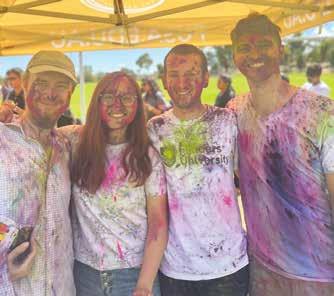
If you have any questions or concerns, please don’t hesitate to reach out to us.
fusa.edu.au



Hey Aries, Happy May! You guys are flaming hot… usually. This month is going to be very cold for you, which is fitting, considering we’re heading towards winter! You’ll need to make a big trip to Kathmandu this month (the shop, not the place). You might find people being frigid, too. You’ll feel as if your heart is on fire while everyone else’s is frosty. Chin up, though — this is why you’re the life of the party! You’re meant to thaw those losers out of their icebergs!

What’s up, Taurus? The sky! Oh come on, laugh a little. Here’s a reason to lift your spirits — partying! For some of you, it’s your birthday, which means you can get away with a lot of things (*evil laugh). But only for 24 hours. Once the clock strikes 12, the spell will break, and you’ll realise just how hard you partied. And for those Taurians who don’t have their birthday in May…hope you’re invited to the party, I guess?
It’s the Twins! Howdy, Geminis. Now, some of you may also be having your birthday this month. But, you guys will be feeling old. Your body will ache in the weirdest of places, you’ll start having an obsession with taxes, you’ll realise you’re dressing eerily similar to your parents/guardians. You may even have multiple Sims moments in which you’ll walk into a room and forget just why you’re there! Not to worry, though — the stars say this will only last a month. Unless you’re above 35…can’t help you old-timers, I’m afraid. Can I offer some Nurofen?


What did I say about not crying, Cancers?! Gosh, you guys annoy me. Probably because I’m an Aries, but I digress. The jig is up this month — you’ve got to come clean. Tell that person how you feel. My third-eye detects a Cancerian wanting to tell someone else that they’re stinky. Maybe don’t tell someone that unless you know them (they can take it). Oh, and yeah, confess your crushes and all that.
Hey, it’s the Zodiac’s honorary divas - Leos! Doesn’t it get annoying, being so goodlooking? Well, it will this month. You’ll be getting attention left and right, up and down, in the middle…you’ll practically beg for a moment alone! Tip: scowling only makes it worse — it gives you a je ne sais quoi quality that attracts people like moths to a bonfire. Maybe you should barricade your doors and windows for a month? That might keep the moths out.
Hey Virgos. Look, I don’t want to be blunt, but have you tried having fun recently? Stop working slavishly on that project of yours. Whether it’s your magnum opus or not, it’s not going to get done in a day. I feel like the flamboyant best friend in a rom-com telling the goal-oriented protagonist to ‘just live a little’! Organise a catch-up with your mates, go to the Tav for a pint, drive up to the Hills and be a hippie in nature (bring a psychedelic jacket, though — it’s frosty). Peace and love.






Hey Libra! How’s one of the best-looking signs do’in? Unfortunately, this month is going to hold one of your biggest weaknesses… making decisions! Dun dun dun! It could be as detrimental as having to choose from a menu that you didn’t get time to look up before you got the restaurant, or as spicy as deciding between your two lovers. Don’t stress too much, perhaps the decision is as simple as choosing multiple dishes… and isn’t the saying, “the more the merrier”?
Scorpio’s, is that distancing behaviour I see? Times are rough right now, and you might think that actually talking about your feelings to your friends will be a load that they couldn’t possibly want to carry. Get over yourselves! You’d want them to come to you if they were struggling right? So, stop it with the martyring BS and call that person you think of every time everything gets too much.
Guys! Please drink some water. Your fur babies and plant children should not be the only ones in your household to get regular food and water. And no, caffeine and energy drinks DO NOT count. I don’t care if they’re made with water, if it’s not straight H2O I’m not gonna count it. Trust me, your body will thank you for it. My third eye is watching.
Oop… those late nights are catching up to you. Deep introspection are your themes throughout May. Late at night, while lying in your bed, staring up at your bare ceiling, those inner thoughts of yours keep pulling you below the surface to really question the motives behind your actions. Be careful, sometimes we can get lost in our heads. Try to get some sleep, if it’s something you feel you need to think about more, maybe wait until morning.
Look at you go! Doing those dishes, putting away those clothes and making your bed? Adulting at its finest! Make sure you’re celebrating the little wins, it might not feel like much, but I know how hard those menial tasks can be. Take a night off, you deserve it!
Okay, so… don’t stress, but for you, I think this month may hold one of my least favourite romance tropes. Misunderstandings and miscommunication. Oh dear. Try to be clear about what you say and be reassuring if anyone takes you the wrong way. We have no idea what it’s like in other people’s heads, so try to keep an open mind and help ground the people around you who aren’t as sure of themselves as you easy-going legends are.


Turnbull oversaw the implementation of the robo-debt scheme. Rather than shutting down opposition from the top, right wing or bigoted ideas should be confronted and challenged publicly by the left. I was proud to be part of organising protests against UK transphobe Kellie-Jay Keen when she came to Adelaide. This shows we don’t have to rely upon government authorities, and can instead use our free speech to push back against hateful and bigoted ideas.
1. For the 2023 O’week, Commonwealth Bank was present and paid the fees of an external entity to Flinders to be able to have a stall, complying with the requirements set by FUSA.
Banks having a presence at these events provides students who may have never had a bank account or are moving from overseas the opportunity to learn about how banking works in Australia.
Providing students with resources to assist in understanding how banking works can be extremely valuable in ensuring they make good financial decisions in times when they may be overwhelmed by the stresses of University. Many students are forced to work to ensure they can financially support themselves in their time as a student and so this opportunity may mean they understand better how to handle their hard-earned money better.
2. While we are not qualified to make opinions on Foreign Affairs we believe that this investment will create an industry that will provide young South Australians with valuable job opportunities that do not currently exist.
3. Everyone deserves the right to have autonomy over themselves without fear of prosecution, hence, freedom of speech should be a right afforded to all people.
As proven across the world, many believe freedom of speech implies freedom of responsibility. Hate speech and other forms of freedom of speech that attack marginalised communities often have legislated consequences applied to them, proving that there are imposed limitations to freedom of speech.
This stands as an example of how the privilege of freedom of speech is misused as a method to attack others, which is not constructive nor a responsible use of this privilege.
In other places, there are limitations on freedom of speech due to authoritative governments, put in place to suppress the voices of those communities. This is an example of a clear misuse of power by those authorities and a clear disregard for the right to freedom of speech.
Freedom of speech is a right everyone deserves; however, we should also understand the weight of the privilege we do possess in Australia and other countries where freedom of speech is a right and should use it to fight for the betterment of the world.

Unite
1. O’Week is for students and having these companies at O’Week isn’t really about students. Their stalls are not aimed at offering internships to business and finance
students; but rather at luring new customers. There is a much more concerning agenda at play, as these companies are trying to sway young students into signing up to their dodgy financial packages, and should not be allowed at any university campus.
That being said, university students are mature adults who can make their own decisions about where to invest their money. However, banks should never be allowed in educational institutions where they can exploit children. The Malinauskas Government’s decision to ban CommBank’s invasive Dollarmites program from schools is a positive step in the right direction, ensuring financial literacy is taught by teachers without a vested interest.
This question has been raised because of one particular student political group’s criticism of having banks on campus. The serious issues facing students go well beyond a banking stall at O’week.
Our energy should be spent focussing on issues such as the abhorrent conditions in student accommodation, particularly for international students, unfair rent increases and accessibility issues for students coming back to campus for the first time since the pandemic.
Unite have and will continue to focus on addressing the cost of living and accessibility issues most relevant to students rather than spouting empty rhetoric about Commbank’s responsibility for interest rate rises that are actually the responsibility of the RBA.
2. Yes. Australian submarines are another tool to ensure our allies are protected and supported; the role of the Australian Defence Force is also one of humanitarian assistance, disaster relief (especially with climate change), security operations, and peacekeeping in the Indo-Pacific region. The Government’s support for our Indo-Pacific neighbours and commitment to stability in the region is evidenced by actions which extend beyond our sovereign maritime capability. The role of our defence force should not be one of aggression and moves in recent times to indicate a more offensive approach to international relations are worrying and should be called out.
In the privileged position, we are able to provide stability and peace for the region; if that’s protecting and supporting our friends against criminal or foreign entities threatening their infrastructure (especially communication), trade, or society.

We are well overdue to replace our submarines, the whole run-around from the previous Liberal Government has put the region in danger, with the Australian manufacturing industry in an uncertain position and our defence personnel at serious risk in expiring craft
3. As individuals of society, we have certain social responsibilities. Although free speech is a fundamental right that should be safeguarded, we must recognise that our actions can have significant consequences. Much like how shouting “fire” in a crowded room can result in repercussions, we must be aware that our words and actions can impact those around us. It is important to exercise our freedom of speech thoughtfully and responsibly; taking into account the potential effects of our words on others. Freedom of speech is never a free pass to incite violence or commit serious harm. The consequences of your actions are not censorship.
Please Note: No Right-wing Clubs or Associations of the Flinders Responded
Everyone living in The Maze knew that setting out into the unknown parts of the extensive labyrinth was to invite a wrong turn. However, this was precisely what Strummer had done after the lacklustre response his performance had received at Slowturn’s only tavern.
“We’ve ‘eard that one,” a burly man had shouted. “And the one before.” The man proceeded to talk over Strummer’s love-ballad, and by the time the bard reached his crescendo, the crowd had lost interest entirely.
Now, Strummer sat nursing his third ale. He had only earned enough coin for a few more nights lodging in a town that found him boring. He regarded his battered lute. “The same old song is playing out in every village now, Old Friend.” He finished his ale and signalled to the publican for a refill, despite being deep in his cups.
“My shout,” a female voice said from behind him.

Strummer turned to find a dark-haired woman. The cut of her clothes was strange, and her hair was an almost unnatural hue, but she smiled affably as she sat across from him. She propped her head on her hand. “Tough crowd.”
Strummer wasn’t sure what she meant. “Indeed, they are a raucous bunch.”
She waved off his words as the ales arrived. “I loved it. Where I come from, the music is less... alive. We’re starved for good entertainment. That’s partly why I came here.”
“What I wouldn’t give to play for an appreciative audience,” Strummer said, patting his lute. “Where might I find such a crowd?”
“The place is called Crackbreak. They’ll love you, but you’ll need this.” From somewhere about her person, she produced a small metal box.
Strummer studied it, noting a series of musical keys down one side.
“Last drinks!” the publican called.
“I have never heard of such a place,” Strummer said to the woman as he puzzled over the box.
“I guess you could say it’s new, but they don’t get many bards,” she said.
To Strummer’s ale-sodden ears, it sounded perfect. “How do I get there?”
“I’ll give you directions.”
Strummer held up a finger, then searched his pack for a scrap of parchment and a quill. He couldn’t memorize Maze directions in his present state. The publican came to stand over the table, hands on hips.

The woman gave him the list of twists and turns to get him to Crackbreak, finishing with, “And don’t forget to use the box.”
Under the publican’s glare, Strummer shoved the box into his pack and gave the smiling stranger his thanks. He set out along the back-paths of the Maze armed with a head full of ale, his hastily scribbled directions, and fanciful imaginings of an ecstatic audience applauding his performance.
That had been hours ago.
Strummer consulted his directions. “Crackbreak should be right here,” he thought. Instead, high stone walls stretched out in both directions. Returning to Slowturn meant more hours of walking in the dark, and without knowing where he went wrong, he could be in even more trouble.
“I’m done for! People walking this path will find my skeleton and say, ‘Here lies lost Strummer, the least original bard!’” He threw the parchment down, followed by his pack, which dislodged the metal box.
The box rattled across the cobblestones, causing a flute-like sound. Strummer picked it up and pressed a key. It sounded like a panpipe, but he couldn’t see what mechanism produced the sounds. He pressed another key, and almost dropped the box as a faded village flickered into view. It was quite unlike anything he had seen before. He crept towards it, but it disappeared, only to be replaced by the now familiar stone walls.
“What?” He pressed a key on the metal box. The scene reappeared, and, with another note, it sharpened. Strummer took a deep breath and played a song. The Maze ahead was replaced with strange buildings lit by fireless lanterns. Carts moved without horses and there were people dressed like the strange woman. The walls of the Maze could be seen in the distance, but they looked like metal rather than stone.
It was The Maze, but changed into something beyond his wildest imagination. Strummer lifted his belongings, and still playing his song on the metal box, stepped through to a new world — one that he could change for the better.

With the edition theme being change, I couldn’t think of anything directly linked to tabletop games that would fill out an entire article by itself. So instead, I have a little collection of ideas all based around change that I thought I’d just try and touch on one at a time. Up first, a little nugget of wisdom that has saved my love of table top games more than once. If you are able to convince your group, it can be a great idea to switch up Dungeon Masters! There’s quite the list of reasons this is a great idea, but here are just a few. One, if your regular DM has played as a character as well as run the show, it can improve their ability to think like a character and keep things moving a hundred fold!
Secondly, give some other players a go to take the helm and tell a story. Chances are you’ll be pleasantly surprised. and players who have DM-ed usually have a better respect of the DM and the game rules. Lastly… a little break in a main campaign to tell a little side story can make excitement levels go through the roof! Honestly, I think it’s done our group wonders. Another idea that’s close to this is that, if you can, switch up the game you’re playing! so many other games have great ideas and allow you to play with other settings that can make tabletop gaming super refreshing. as well as this, you’ll come across so many ideas you can port straight across into Dungeons and Dragons as well. I’ve already mentioned Stars Without Numbers before here, and like I said there, its free and a great place to start.

It’s also worth noting that dungeons and dragons has had several different editions itself as well, with the current edition we play called 5th edition. I know some people still enjoy 4th edition and even 3.5 gets talked about still. The same goes for plenty of other systems, with pathfinder having several, and the Warhammer role playing games having several different games and updates. It’s definitely worth checking out other versions, there are some ideas in the older dnd that are actually pretty cool and can add some tension. 3.5 in particular was a little more complicated, but had a system for leveling beyond level 20, and a different system to determine skills. It’s a dnd version I’ve always wanted to try.
I think change is a good thing in almost all walks of life, and time and time again, when it concerns tabletop games, I’ve never had change teach me nothing and ruin the games. Usually, even if the new game were trying is a little complicated, or the new DM doesn’t quite get it, the lessons we learn through the process teach me how to better run a game, and in the long run, how to have a lot more fun!
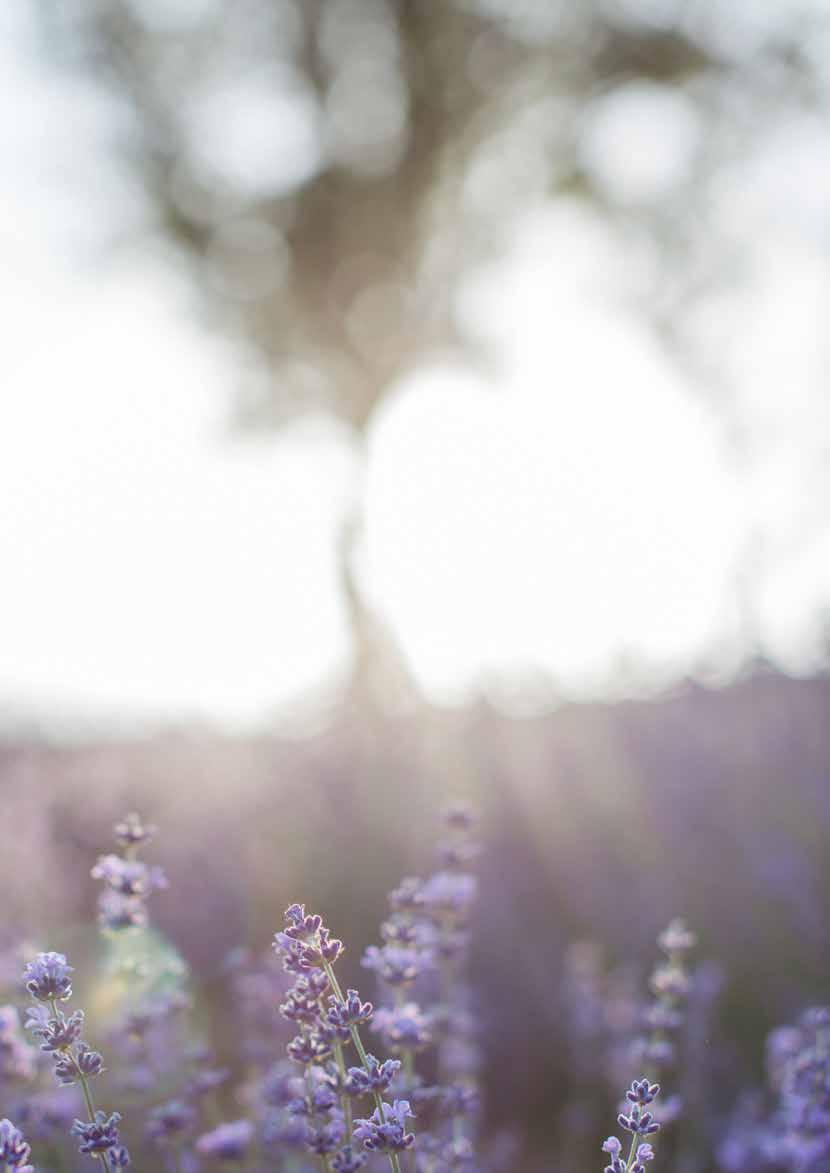
Margot is a mature aged creative writing honours student.
I’m a mother of an autistic young woman, however, until two years ago I could not have legitimately made that statement. Nor could my daughter have been able to legitimately identify as autistic. My family experienced years (sixteen to be precise) of both armchair and actual experts pigeonholing my daughter under the one-size-fits-all label of ‘generalised anxiety’.
Back in 2004, as a first-time mother, I had a persistent, unfiltered drip-feed from family, friends, neighbours, supermarket check-out operators, hairdressers, everyman, and their dog, who all offered opinions and advice on pregnancy and parenting; on what I was doing wrong and why my new baby girl would not stop crying and would not sleep. I was spoiling her by holding her too much. I needed to be tough. I needed to let her cry. Babies like going for walks in a pram (my baby didn’t). Babies like being bathed (my baby didn’t). Babies like car rides (my baby didn’t). My baby screamed through everything that ‘normal’ babies liked.
And so it went on.
At kindy I was informed my daughter had ‘severe separation anxiety’ and that I should make our home so uncomfortable and unwelcoming that she would want to leave it to come to kindy. I was advised my daughter should see a child psychologist. We dutifully booked her in with the recommended psychologist, only to be told that our daughter was ‘spoilt and used to getting her own way’.
And so it went on.
At primary school we were advised, once more, to somehow deconstruct our home from the safe haven that I had intentionally created for my little family to something less inviting, the theory being (again) that my daughter would be glad to be away from it. At the behest of educators and mental health professionals, we devised sticker chart reward systems; going to school was ‘good’ and warranted a sticker. Not going to school was ‘bad’ and a sticker was taken away. We invested in aromatherapy diffusers and organic essential lavender oil in little roll-on bottles, which we applied to her pulse points; behind her ears, wrists, temples and bottom of her feet. Her school refusal became so chronic, that the front desk receptionist warned me the school might have to involve the police. ‘Good,’ I said. ‘Call the police. Then we might actually get some help.’
And so it went on.
I knew, in my gut, that whatever was going on with my daughter, it was bigger than lavender oil and sticker charts. But neither she, nor I, nor her father could put a name to it.
And so it went on… until October 2019. A close friend of mine, who has known my daughter since she was six months old, sent me a text message. It read: Have you considered that your daughter might be autistic? It presents differently in girls.
Wait! What?
Autistic? I was almost offended. My knowledge of autism was limited to the Hollywood ‘genius savant’ portrayed by Dustin Hoffman in the 1996 movie Rain Man, and the little boy at my kids’ school who had chairthrowing meltdowns in the classroom. My daughter didn’t throw chairs. But she did have meltdowns once she was within the confines of her overly comfortable, safe-haven home.
Then, two days after I received that well-meaning but disconcerting message from my friend, we were in
Melbourne for PAX (the gaming Force is strong in our family). We were at a bustling, noisy Thai restaurant and my daughter was shutting down, getting teary and panicked. Wordlessly, I opened the message from my friend and covertly passed it under the table to my husband. I studied him as he read the message, waiting for a dismissive eye-roll and for him to sling my phone back to me with a reassuring ‘of course our daughter isn’t autistic’ look. But he didn’t. His expression was serious as he read my friend’s message. Then his eyes met mine. And he nodded.
In that moment, my perception of our little world changed. Permanently.

I gingerly offered my daughter my ear buds to distract her from the ambient noise of the busy restaurant. She accepted, put them in and then sat, quietly absorbed in her Switch, until it was time to leave.
Once we returned to Adelaide, I began trying the word ‘autism’ out for size. I floated it past educators, health professionals, family, and friends. Their response was unified: my daughter couldn’t possibly be autistic. She can smile. She makes eye contact. She has a sense of humour. She has empathy. She doesn’t look autistic.
And so it went on.
She lasted for two weeks at High School. We then home schooled her. She was withdrawing into herself. My beautiful, vibrant, creative, loving, funny, caring daughter was becoming a shadow. Paler. Thinner. I feared she might disappear altogether. Cease to exist. I was bewildered and terrified. Still, she could not put into words how she felt. But, thanks to a character in a JRPG and a WordPress blog post, everything was about to change.
At the end of 2020, my daughter mentioned how much she identifies with Futaba, a character from Persona 5.
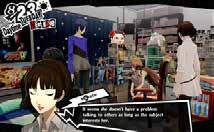


My own reseach led me to a blog by Sam Rowett, a UK based professional Game & Narrative Designer, which was written in a way that helped me to understand.
I read it. And re-read it. Finally, finally, my daughter had found a way to verbalise her experience. I sent a link of Sam Rowett’s article to her psychologist and by May of 2023 my daughter was finally, finally officially diagnosed with ASD (Autism Spectrum Disorder). On receiving her diagnosis, my daughter burst into tears of relief and joy and thanked the medical professional. I cried too but my relief was also tinged with fear. How would our life look now? What will the future hold for my daughter? One close family member, on hearing about my daughter’s autism diagnosis, blurted, ‘Oh, that’s awful. They can’t cure that, can they?’ This isn’t one of those ‘just add a diagnosis and everyone lived happily ever after’ stories. My daughter faces ongoing daily challenges as a neurodivergent young woman navigating a neurotypical society. As soon as my daughter was legally old enough to leave school, we pulled her out. She now devotes her time to her passions: digital art, gaming and streaming. She has taught herself to play the drums, electric and bass guitar. She is currently attending weekly singing lessons. She has a small band of loyal online friends but her old school friends have, naturally, left her behind as they forge ahead with boyfriends, partying, driving, gap years and Uni. While my daughter is yet to venture too far into the ‘real’ world beyond her comfort zone of home and games, it remains my hope that one day, the rest of the world will be lucky enough to know my daughter as I do: vibrant, funny, caring, creative, courageous, Autistic.
I’d love to hear about your own Wait! What? moments, where your perception of self, or others, has been altered by finally receiving a long-awaited diagnosis.
Dir. by Carlo Mirabella-Davis 2019
TW: Self-harming, Sexual Assault, Mental Health/Disorder, Toxic Relationships, and Abortion.
Swallow (2019) is written and directed by Carlo Mirabella-Davis. The film focuses on a pregnant woman named Hunter (Haley Bennett) with Pica Disorder trapped with a heartless abusive husband (Austin Stowell). The film is a straight up cinematically beautiful film with Katelin Arizmendi behind the lens; who is now well-known for Dune (2021). In my opinion if you like Gone Girl (2014), you would like this. The camera was an ARRI amira with prime lenses, an aspect ratio of which is 2.39:1 - (which is my personal favourite Aspect Ratio).
Colour plays a striking role in this film not just by cinematography but also in the background of the story and character’s minds. The colours and visuals show you what’s going on especially in the heads of characters, this film is a perfect example of how a skilled filmmaker can use colour. It’s subtle, yet impressive and vital. Colour consistency fills the scenes, and bright colours want to pop out of the screen and it contrasts nicely from scene to scene. The film begins with simple and delightful textures, which develop into those simple textures disappearing. As Hunter enters a society without the Ikea minimalism and the textures change from grey and earth tones to mixed colours and graphic tees.
This film shows depth in scenes with the use of wide/far shots, unbalanced lighting, and the contrast in colours. Every frame has a powerful visual look, the use of colour and contrast is particularly impressive, with vibrant, saturated hues of pinks, yellows, blues which conveys Hunter’s inner life and the drab with its own drab sterile tones of her surroundings highlighting her life of confinement and oppression. Many shots of simplicity and stability convey Hunter’s sense of control and agency just as she presents herself on the outside, while abrupt, jarring cuts portray the moments of distress and disorientation for Hunter. The camera techniques used are a significant emotional tool to portray the depth to the film’s exploration of mental illness, and abusive control. The camera often looks over Hunter, belittles her and makes her look weak.
I’m not an expert of horror films however I feel like there are uses of Classic 80s horror cliques and the film employs multiple visual motifs, including recurring images of Hunter’s consumption of inedible objects to reinforce the film’s themes of control, desire, and the struggle for autonomy. Thanks to what I can only guess are prime lenses; the quality of the image is sharp which helps with that depth in scenes and beautiful lighting of low lighting conditions.
There is a thematic regularity of isolation, control and power. Hunter mimics her surroundings and people around her by using colour and clothing, like it makes her feel powerful. Hunter is battling control and power over herself despite the Men in her family constantly trying to control and dictate her life, so much so that even when her step mother tells her to do something it comes from the men.
I believe Carlo Mirabella-Davis has written in the idea that women hurt internally, while men hurt externally - men push outside by shouting, violent and controlling while women push in by harming and isolating themselves.
Hunter’s relationships in Swallow (2019) are complex and often difficult to say the least, reflecting the film’s broader themes of isolation and the struggle to connect with others in a world that seeks to control and suppress individuality based on gender roles. Richie only cares about himself and has little knowledge about Hunter; he has to pay people to learn about her, he can’t even bother to listen and understand her. Richie’s family are narcissistic and are known to look down on others, believing that they are more knowledgeable than others despite having workers to do everything for them. The only people that care about Hunter are the household employees. Richie controls her speech, cutting her off in sentences, her money and treats her as a possession. Hunter wants to make him happy and apologises to him repeatedly even though he never does. The viewers understand throughout the movie that Hunter won’t be free until she makes herself happy.
The rule of thirds is used to the story’s advantage as often Hunter is on the corner of the screen out in the open and vulnerable to the world. Hunter is often divided by everyone else with a line in the corner. In these scenes, Hunter’s family treats her like a kid and talks over her. Showing a frame inside a frame expresses the feeling of being trapped with no space, even in a large room, there is still no space.
Swallow (2019) is a vibrantly haunting, powerful and thought-provoking psychological thriller that delves into the complexities of mental illness, and individual autonomy. The film’s powerful performances, stunning visual look, and camera techniques create an emotionally resonant experience that stays with the viewer long after the credits have rolled. The film’s exploration of the suffocating expectations placed on women is particularly striking, and its use of colour and contrast creates a striking atmosphere that perfectly captures the psychological intensity of Hunter’s journey. I had many more notes that I didn’t expand on and I’ve probably repeated, so do yourself a favour and watch this film - I can’t lie, I haven’t ever squirmed like this in my life except with this film.
As of writing, Swallow (2019) is available to watch on MUBI. mubi.com/films/swallow

Interested in films? - You should consider joining the Flinders University Film Society

 By Katie Stedman
By Katie Stedman
Change can be something that really bothers me.
I’m terrible at keeping my phone updated, because it means getting used to new features and settings. If a favourite food item is discontinued, I’m left searching for something new to replace it. Looking for a new job would mean saying goodbye to the workmates I already have.
None of these things are necessarily bad. In fact, change is nearly always made with the idea of advancement and improvement in mind—those new phone updates are designed to make things safer and more efficient; I’m now open to come across a healthier food alternative; that new job will help me grow as a person.
So why can it be so difficult to accept and embrace change? Does it mean that I’m lazy? Does it mean that I’m stuck in the past? Does everything about my life or society need to change? Does it mean that I don’t want to grow or advance as a person, or overcome new challenges?
The simple answer is ‘no’.
I know I’m not the only one that feels this way about change. But why are we like this?
I think it has a lot to do with personality. Some of us are naturally bigger risk-takers, and others have a well-defined comfort-zone. Some of us can adapt easily to the changes, and others need to feel in control of certain aspects of their lives.
Change is a concept that looks to the future, and so it can be debilitating to constantly look to the past as a comparison. How can we know the old option was better without first having given the new option a go? On a larger scale, change provides hope that things will get better, and on a smaller scale, it shows how effective and beneficial little changes can be.
We still have a long way to go, but society would not be where it is today without change. Not many people would be happy about losing the benefits that have come with change— healthcare, rights, electricity, sanitation, education and so on.
We can’t stop change, but we can change the way we view it.
”Change is inevitable. Growth is optional.”
- John C. Maxwell.
Your voice echoes through the crack in the ceiling.
I pull at its sides like teeth splitting skin. Blood on my tongue, I’m a carnivore and you’re flesh.
It’s a puddle, There’s drip-dropping rain. You splash through with military boots and the midnight weapon strapped to your waist. There’s an inevitability to the destruction.
It runs in veins, with the certainty of life. Change is upon me, a wicked heartbeat inside. Its organs are slow, sluggish, tick
away.
You carve it out, a scalpel and a fork. It sits on a plate and you ask, ‘Is this what you wanted?’
My chest aches with the weight, the lack thereof. Bandages piece me together but there are wounds underneath that ripple my skin, held together by string and tied up in a neat little bow. It’s like a gift, one that I paid for on my own.
‘Yes,’ I tell you.
The lady in the waiting room says it’s a big change. You agree with her, because of course you do.

‘Yes,’ I tell her.
And the world keeps turning.
a work by harry kellaway all things



featuring: paddy maddern int:@harry.kellaway

must pass.
”none of life’s strings can last so, i must be on my way and face another day”
- george harrison
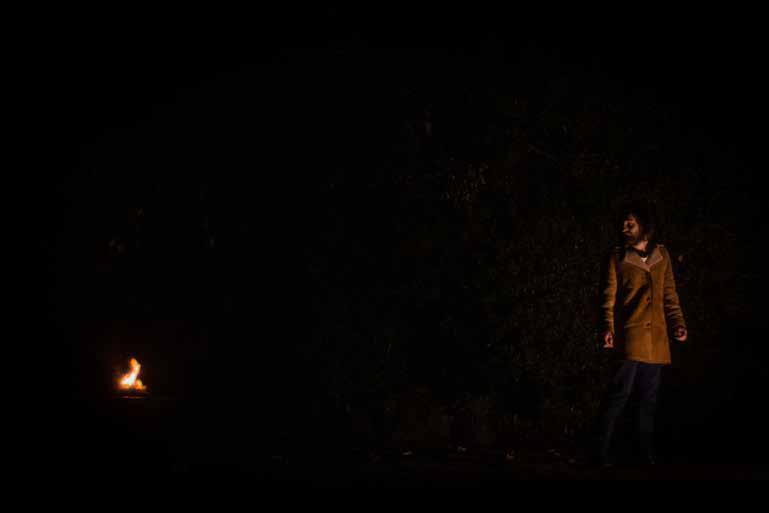



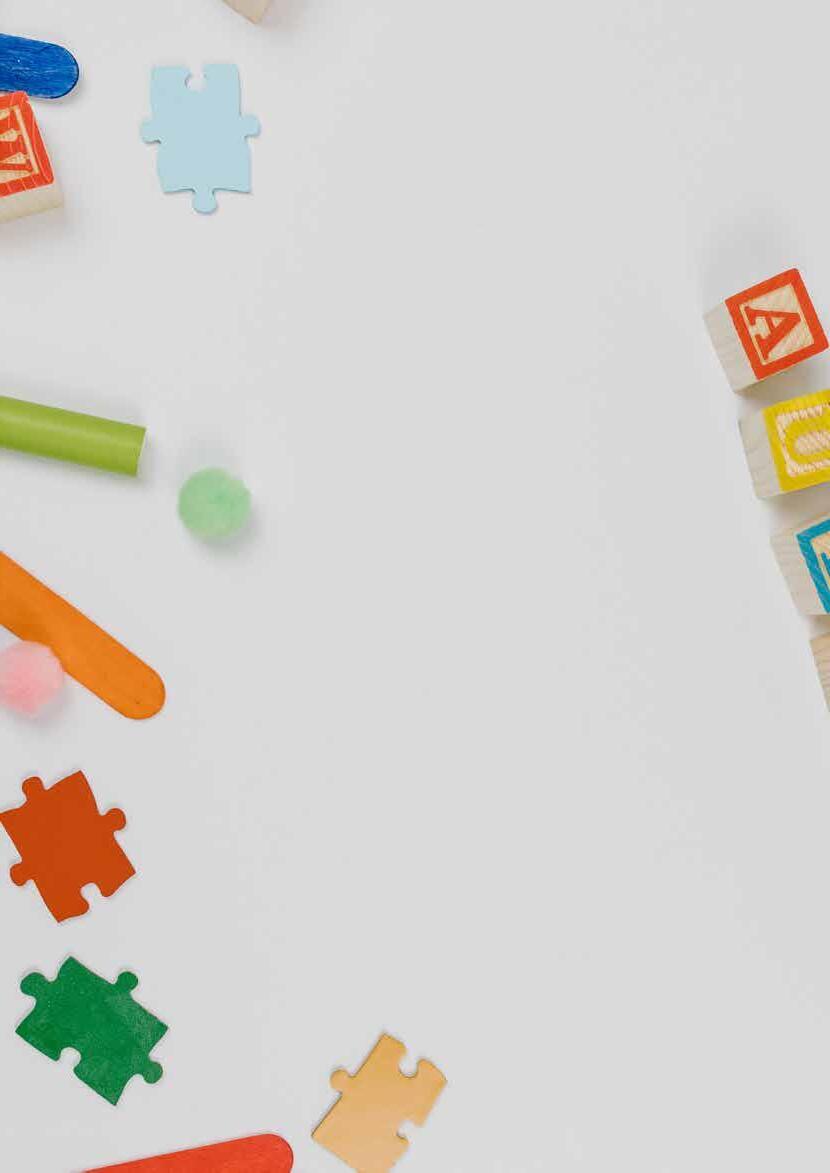
er is a puzzle generation tool for teachers, students ustomized word search, criss-cross, math puzzles, a ists



everyone for their pronouns, not just the people you think might be transgender. Not everyone is comfortable giving their pronouns, and that’s okay. The most important thing is normalising the practice of not assuming anyone’s pronouns—when you don’t know someone’s pronouns, default to ‘they/them’.
With this issue of Empire Times’ theme being CHANGE, and International Transgender Day of Visibility which was on March 31st, it seemed like the perfect time to write an article to combat the growing hate and ignorance that trans people face every day.

Here is a short guide on how you can help trans people on (and off) campus and become confident in being a good ally!
We all have them! It may seem like a simple thing, but respecting and using correct pronouns is one of the easiest ways to help trans people on campus. Check in with people if you want to be sure—a quick question is preferable to potentially misgendering someone. However, introducing yourself using your pronouns is a great way to let trans people know they’re in a safe and accepting environment and allowing them to disclose their pronouns without feeling singled out. As part of introductions, make sure to ask
A short note on the singular ‘they’: Some people who don’t prefer binary pronouns like he/him or she/her use they/them pronouns! This can take a while to get the hang of it, but you’ve probably been using the singular ‘they’ forever without even noticing it! For example, if someone at a party left some sunglasses behind, you might ask ‘Who left their sunglasses here? Well, I hope they come back. I wouldn’t want them to be without sunglasses.’ The singular ‘they’ has been in use for hundreds of years—it’s nothing new!
Sometimes you might slip up and use the wrong name or pronoun. It doesn’t have to be a big deal. The most important thing is to correct yourself and move on. No need to profusely apologise and draw attention to it.
If you are a cis (non-trans) person, it is important that you use your voice to uplift and support trans people and educate others so they can do better. When you notice disparaging, offensive, or discriminatory behaviour, challenge it. Correct others when they misgender or deadname a trans person, educate those with more conservative or outdated views, and support trans people who may
not be able to speak up for themselves. Learn about anti-trans legislation such as the Religious Discrimination Act here in Australia, or anti-trans bills overseas in places such as the U.S. (e.g. Texas) and the UK, and use your voice to protest them.
A great way to support trans people is to educate yourself. Trans people are often bombarded with questions about their transition or pronouns or “the surgery”. Some of these questions may be offensive and some may just be repetitive, but you should never expect someone to educate you when you could easily educate yourself.
Here are some great resources to start with:
The Pronoun Lowdown by Nevo Zisin, a trans non-binary author from Naarm. What’s the T? by Juno Dawson, a trans woman from the UK.
Many websites also have a variety of resources for allies:
Flinders University
Minus18
Transcend Australia
ShineSA
TransHealthSA
There is no universal trans experience: everyone is different. Listen to the trans people in your life and around you to learn their preferences and the best ways to support them. Respect transgender people’s autonomy and decisions—we reserve the right not to disclose or provide any information that we don’t want to. If you’re told that a line of questioning or something you’ve said is inappropriate, respect that and move on.
A good rule to live by—if you wouldn’t ask a non-trans person that question, don’t ask a trans person. Surgeries, medical procedures and bodies often become
the largest focus on trangender people— understand that it can be uncomfortable to have people assume they’re entitled to such personal information—you’re not owed that.
Trans people have a long history of being misrepresented and mistreated in the media—as victims, as punchlines, and as villains. Ask yourself: are trans people being represented in what I’m watching? How are they being represented?
For a more in depth discussion and timeline of this kind of representation, I highly recommend the video essay Tracing the Roots of Pop Culture Transphobia.
Donate to organisations and support trans individuals.
If you can, donate to organisations that educate people and help transgender people with finding support.
Some Australian LGBT+ charities: Black Rainbow *
BlaQ *
Transcend Australia
Minus18
Support a trans artist, musician, or creator, or donate to any local ‘GoFundMe’s or fundraisers for surgeries and other needed supports.
The trans community and the LGBT+ community as a whole is so welcoming and accepting of everyone—get involved here on campus! Learn about FUSA and the Pride Network’s Campaign To End Deadnaming, work with the Pride Network to advocate for LGBT+ students in your course, and try putting this guide to use in your classes and on campus.
“The whole literature of the past will have been destroyed. Chaucer, Shakespeare, Milton, Byron, they’ll exist only in Newspeak versions, not merely changed into something different, but actually changed into something contradictory of what they used to be.”
-George OrwellWhen we start to make changes to classic texts, where do we draw the line between inclusion and the censorship of history and our culture? And who decides what that line is?
Thoughts, opinions, beliefs, and ideologies all change over time. They change with

experience, education, and circumstances. They are influenced by what we consume, text, film, music, and conversation. But the question is, do we need to change our past, and our history every time these things change? Or do we preserve our past and create new?
In 2021, six Dr Seuss books were pulled from future publication for their portrayal of people of colour and Asian people. However, the latest victims of modern sensibilities, Roald Dahl and Enid Blyton have had their works undergo broad changes. Changes that are labelled as ‘inclusive’ and are (apparently) to protect our children from cultural, ethical and

gender stereotypes and offensive language in literature.
The changes to Dahl’s work were described as ‘minimal and well-considered’. Most of the changes relate to race, gender, weight, and mental health. Words like ‘ugly’ and ‘fat’, for example, were removed. Any reference to ‘females’ changed to ‘women’, with gender-neutral terms preferred. However, editors had also added entirely new sentences to his stories.

Enid Blyton’s book series the Famous Five will have phrases like ‘shut up’, ‘don’t be an ass’, and ‘don’t be an idiot’ removed or changed. To make them acceptable to the modern reader. Through these days, let’s be honest, there are certainly a number of people who could benefit from not ‘being an ass’ and who should just ‘shut up’.
These are not small changes. These are big changes and change the original story.
So, why these words and phrases? They are still commonplace today, good, and bad. Why hide them from children? The world is filled with nastiness and meanness. Denying and hiding this fact means we won’t teach our children how to navigate such things. Dahl and Blyton’s books teach kids to navigate life in an adventurous way. I have yet to meet any adult damaged by the words in these books.

I think Philip DiFranco sums this all up so well when he said: “I understand the desire to make something more accessible, but you’re changing what it is. It is a story written by a certain person at a certain place at a certain time. I think in general this is an edge of a coffee table that doesn’t need to be padded.”
I ask again where do we draw the line? Who decides what is inclusive and what to exclude? This is our artistic history; it is an
attack on artistic creativity and freedom of expression. Exclusion in the name of inclusion.
The French versions of Roald Dahl’s books haven’t changed since they were translated in 1960. And the French don’t plan on making any adaptations. They believe in an author’s moral rights, including their right to authorship and respect for their work’s integrity. And though changes to a dead author’s work are not illegal, the French believe ‘it is dangerous for culture’.
“How far back should we go? Baudelaire? Voltaire? The Bible? If books are changed in this way they are not the original works. It’s not far off censorship,”
-Antoise CheronWant more inclusive and diverse texts? Don’t re-write history, write new works. It’s more inclusive to do this than it is to exclude what has come before. Changing/ censoring the classics is not so much about inclusivity and more about exclusivity. It’s about censorship. And that’s just hiding reality, our history, and our culture.
What’s more offensive is that it’s you they don’t trust. Your ability as a parent, your ability to explain ‘bad words’. Your ability to explain differences and appropriate behaviour and language. They don’t trust your choices and ability to raise your own children. So, they dilute the things around your children, so you cannot decide. And the reality is, kids are smarter and wiser than we might think.
I guess I just don’t like where we are heading here censorship-wise. The policing of language and forced compliance by the minority is not what I imagined our goal was when we stood towards parliament and demanded to be heard.
What have you done to get where you are today?
I studied the Bachelor of Creative Arts Digital Media degree (now called VEED). I started my degree in 2017 and graduated in 2021. After spending a few years freelancing in the live action film industry as a videographer and camera operator/assistant, I decided that it wasn’t the right fit for me.
I’d always loved drawing and 2D animation was something I had always wanted to learn. When I made the decision to study animation, Flinders had just paired up with the art school CDW so for me that sealed the deal that this was the degree I needed to study. Now, I’m working full time as a 2D Animator at a studio in Adelaide.
What do you think have been your greatest achievements since completing your degree?
I was fortunate enough to get to work as an animator on the series Moon Girl and Devil Dinosaur for Disney TVA. It had always been a bucket list goal of mine to work for Disney in some capacity. It was also the first time I saw gifs and memes, made by fans, from scenes that I had worked on, which makes me super happy.

What would you do differently after just completing your degree and trying to find a job in your area of study?
I was in the fortunate position where I gained full-time employment as a junior Animator midway through the second year of my degree. When I was offered this job, I remember struggling to decide if I should accept the offer or complete my studies first. I wondered if I was ready or not.

I’m so grateful to have had the support of my course coordinators, Shane Bevin and Katie Cavanagh, who encouraged me to accept the job, as opportunities like this are quite rare in the animation industry. In hindsight, I’m glad I decided to accept the job and delay my studies because it gave me my start in the industry and is the reason I’ve had consistent work ever since.
What do you like most about what you do?
I remember as a kid watching movies like The Lion King or The Little Mermaid, knowing that the characters were just drawings done by hand, but not understanding how they were moving and so full of life. It felt like some kind of magic to me. Being able to do this now, I still get a buzz when I hit play on my animation timeline and see my drawings come to life and give a performance that feels genuine and natural.
This advice probably applies mostly to those who are studying in the creative field… don’t underestimate how long things can take. For example, a piece of artwork, animation or video, whatever it is, go at your own pace, but keep in mind that it’s going to require a lot of time and effort, and be okay with that. In most creative industries there isn’t one set path that will get you a job, and every professional will have a different story about how they got to where they are, so it isn’t helpful to compare yourself to others. Be patient, work hard, and make the right connections.
It’s always been a goal of mine to work on a feature length 2D animated film, so I’m aiming to be able to do that one day.
Around these pages are some awesome stills that Jed has worked on!
Lego Monkie Kid can be seen on Binge, and Marvel’s Moon Girl and Devil Dinosaur can be seen on Disney+








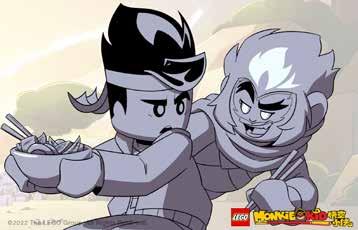



One in a hundred, that is the chanceTo be watched, uncontrolled, The need to give into the hunch. Hyperactivity then the regret
I feel the invisible, An urge to forget, As the children lay pointing, Across the roller top desks.
Bright white lightA clock ticks and I tick back.
I am the architect, Stuck in a straitjacket.
Genteel and burning red, Compulsions stuck in my head Spoken words never intended to be said, Locked together as chains on a fence.
My hands are restless, tense, My heart bleeds a humiliating beat, But I am small and cannot comprehend, That this is just who I am.
One day I shall rise and never fall down again, Make peace with your misery Or fail to see the celebration of
A new foundation, freedom is dead.
I wish to be a portrait, Smooth and weightless, With each stroke, I make no movement, The beautiful colours provide relaxation,
And I’ll stand without any intrusion. A pigmentless positionMy expression the same, for years to come, There is no pain.

This can never be the case, My body disjointed and unafraid, Sat flat in a building unchanged, In front of a white coat ready for examination.
Taking in what I already know This disposition is freeing, A diagnostic explanation of fear, Perished in understanding.
I rock back in relief, Then fall forward in disbelief, There is no taking in the history,
The misplaced conceptions pushed upon me.
My head pushed up against my hands. There are two reactions, One is calm and fair. The other enraged and scared.
I am forced to leave the canvas, It has become so lonely, my mind encumbered.
It was never not normal, only circumstantial, One in a hundred, those are the chances.
 Words By Oliver Land
Words By Oliver Land
For this issue, I’m going to change my format a little, and discuss something I feel is super important. Like any form of art, music has so many genres, sub genres and niche little styles that it can be a little scary. However, I think it’s also one of the best things about it. You can only really appreciate this, though, if every so often you switch up what you listen to!
I was born in England and spent the first ten years of my life there, with both of my very English parents. Inevitably, this made a huge impact on my music taste! My mum took it upon herself to teach me about the Mods and Rockers, and the Battle of Britpop, both of which I still find fascinating, while my dad had a little more out their taste in music, teaching me about goth bands like Bauhaus and Sisters of Mercy. Both of them taught me, and continue to teach me, about all sorts of interesting bands and artists, almost all of which fall into my Spotify rotation. I’ve heard it said that it’s not until high school, when you’re a teenager and you want to rebel, that you really discover your own taste in music. While this was most definitely true for me (like you will see) these songs formed the bases for me and what I would become interested in.
sure exactly how I stumbled across this vast chasm of music that I’d never heard of, but I was hooked immediately. Trying to explain why I like the genre while I’m watching my word count, I feel will be impossible, but this is still the community I am closest to. Going to as many gigs as I can, and listening to almost everything I can get my hands on, I’ve come to know the genre about as well as I can, and yet I still must explain what the whole deal is every time I mention it in front of my mother.
Much to my parents’ horror, in high school I discovered something new and very exciting. Metal! I’m not
I think the point I’m trying to make, without writing a full argumentative essay, is that by being open to other genres and ideas, I discovered a new thing that has become a major part of my identity. Much like the bands themselves that try different albums in different styles (a good example would be Gorillaz, switching up their albums as they grow. A bad example, and a personal vendetta of mine, would be the laziness in Muses last couple of albums. If you want to argue this point, please let me know.), I continue to try other music, and as a drummer I listen to a fair amount of jazz and rock music. A housemate of mine has convinced me to try more mainstream rap music, and I’m discovering it’s as deep and varied as metal, and much like it, there is something for everyone. I feel for people who only listen to one genre or era of music, after all there’s whole worlds of art they’re missing out there.
© Harry Kellaway Words by Blake Walden
Words by Blake Walden
In 2023, the world is pushing toward a greener, smarter and cleaner future, so why do we still go racing? On the surface it is easy to look at Formula 1 and think ‘this is the most antithetical activity humans can perform in the pursuit of a greener future.’ …Or is it? Let’s examine some of the incredible ways Formula 1 technologies have been applied to create that greener future.
The first thing that comes to mind when thinking about the technology of Formula 1 is the Power Unit. Note the term Power Unit and not simply ‘engine’ as modern Formula 1 cars employ a hybrid powertrain consisting of both a battery and ICE (Internal Combustion Engine).
In 2014, the FIA announced plans to change the regulated engine spec from a 2.4l V8 to a 1.6l V6 Hybrid. This change saw an increase in thermal efficiency,
i.e. how much energy is converted from combustion of fuel into momentum, that produced 25% less CO2 emissions and 20% more power. By 2019, the shrieking V6 hybrids had achieved over 50% thermal efficiency, an enormous increase on the 29% efficiency of the howling V8’s. These were the most thermally efficient PU’s on earth.
That 20% increase in efficiency is already present in the cars we buy today; with more manufacturers than ever adopting these innovations to improve the efficiency of their vehicles, leading to cooler cities, fewer emissions and less fuel burnt.
Innovations in the hybrid systems of Formula 1 cars such as the MGU-K (an iteration on mechanical KERS systems) have also benefited FEV’s, helping recover thermal energy from braking and converting it into deployable battery energy. Today, many buses employ this technology. On the Isle of Eigg (which isn’t connected to the UK’s power grid)
the same KERS flywheel energy storage systems are used as a primary energy source.
Formula 1 intends to transition to fully synthetic carbon-neutral racing fuels by 2026. These will be the most efficient liquid fuels on earth, according to those involved with the projects, and be usable in consumer vehicles as well. If successful, this fuel may prove to be another step in preventing the further pillage of Mother Gaia for fossil fuels.

Innovations in the way manufacturers manage aerodynamic forces around their cars are essential for achieving peak efficiency. The Mercedes EQS, a fully electric S-class sister car, sports the lowest drag coefficient of any vehicle on public roads at 0.2, this magic is credited largely due to insights from the Mercedes F1 technologies division.
These aerodynamic gifts aren’t applied only to road vehicles however, as sailing, cycling and bobsleigh have also employed similar aerodynamic wizardry to achieve feats that only decades ago would be thought impossible.
If you value human life, then the
innovations of the Formula 1 Monocoque are a work of divine intervention. The carbon fibre (another technology invented by Formula 1 by-the-by,) tub of a formula 1 car is capable of surviving a 50g+ impacts so competently that the drivers are able to walk out of it. Other innovations surrounding this such as the 5 point harness, quick release belts, form-fitted seats and innovations in tyre technologies.
Just about everything else in a car...
Many of the features that we take for granted today have descended from the realm of Formula 1, most prevalent are the buttons that now litter our steering wheels and the manual paddle shifters on the back of almost every production vehicle. Adaptive suspension systems hailed from the skunkworks of Formula 1 teams. Traction Control, Launch Control, the accelerometer and ABS systems were either introduced or greatly improved by Formula 1 engineers as well.
Even with all this, I have only begun to touch the surface of Formula 1’s technological contributions to society in their pursuit of the perfect lap. If you’re interested in seeing more innovations develop throughout the 2023 season, follow Sam Collins and Craig Scarborough, F1’s resident tech gurus.
‘If you work in hospitality it should be the bare minimum to be safe in your workplace.’

This is what Jamie Bucirde tells me, just weeks after launching Not So Hospitable - an Instagram page that hosts the testimonies of hundreds of Adelaide’s hospitality workers surrounding their experiences with sexual violence in their workplaces. Four days after its launch, the page had received over 200 submissions.
I interviewed Jamie back in August of 2022, so some may say I’ve missed the opportunity to break a story here. In fact, since launching Not So Hospitable, Jamie has received coverage from a range of news outlets, hosted webinars in collaboration with the Working Women Centre and worked with government bodies to advocate for legislative change to create safer working conditions and accessible trainings for venues.
But the most important part of all this is the conversations the page was meant to spark – and that dialogue needs to be ongoing.
Sexual violence is a worker’s rights issue –and it is one that we need to start taking seriously, and collectively organising against. One of Jamie’s key suggestions for doing so is the creation of a role akin to a COVID-19 Marshall. She believes that ‘all hospitality venues should undergo sexual harassment and abuse (SHSA) training within the workplace’ and that ‘you shouldn’t be able to operate as a venue without it. This training would cover ‘how to identify toxic workplace behaviour, how to report it, and how to make sure your report has been taken seriously’. However, sexual violence, and, of course, the general exploitation and abuse of workers, in Adelaide’s hospitability industry is also inextricably linked to broader working conditions – namely, the
precarious nature of hospo work. It is this culture that Jamie argues ‘helps perpetuate abuse’.

The Working Women Centre published a report in 2022 entitled ‘The Protective Power of Job Security’, that effectively outlines the ways in which casual workers hold less power in workplaces, possess less security in their jobs and are therefore more vulnerable to gendered violence. As Emma Johnson of the Working Women Centre puts it, ‘precarious workers will put up with things like sexual harassment at work as raising their right would cause the loss of the only pay they have’. This is compounded by the fact that ‘the systems in place aren’t actually designed to protect people, they are created to silence us’, as Jamie argues.
The systems we have, created and perpetuated by bosses, are not meant to serve workers; and in the absence of this, we must find new ways to protect each other and create alternate mechanisms for safety and justice within our communities; while continuing to place pressure on those who do hold power. Not So Hospitable is a key example of how this can be accomplished in a way that pushes the most affected voices to the forefront; and that is why, six months on, I am still writing about an Instagram page.
If you want to find out more and show your support, go visit the Instagram page @notsohospitable
Words by Tahlia Dilberovic
Climate change is the result of gasses that are released during the burning of fossil fuels such as coal, oil and gas which then create a blanket around the world which traps heat. This creates more extreme and unpredictable events in weather, like heatwaves and droughts. These things all have a compounding effect on other aspects of our earth such as sea levels, and alpine regions. Our oceans are becoming warmer and are increasing in their acidity as they absorb excess carbon from the atmosphere which impacts marine life of all kinds. The impacts of climate change not only affects us but all life on Earth. Just as humans need to be comfortable in their environment as do any other creatures. Animals are migrating from places they have lived in for years to escape the results of climate change and a lot are not able to do that because of severe weather events.
Climate change and global warming is something that we think of as happening in the future. The truth is it is already happening, and evidence can be seen throughout the world.

The Australian Bureau of Meteorology and the CSIRO are responsible for monitoring and communicating current and future changes in Australia’s climate. They have recorded that Australia’s climate has warmed by an average of 1.47 + or - 0.24 °C since records
started in 1910. The sea surface has increased by an average of 1.05 °C since 1900 which causes more intense heat events over land and sea. There has been a 15% decline in rainfall between April and October and in the same area May to July rainfall has recorded a 19% decline in rainfall since 1970. There has been an increase in extreme fire weather and longer seasons across the country since the 1950s. There has been a decrease in the number of tropical cyclones in the region. Snow depth, cover and number of snow days have decreased in the alpine regions since the late 1950s. Oceans around Australia have warmed by more than 1°C and are acidifying causing marine heatwaves. Sea levels are rising around Australia increasing the risk of damage to coastal communities and infrastructure.
Globally greenhouse gas emissions continue to rise with the global mean carbon dioxide levels reaching 414.4 parts per million in 2021 and all greenhouse gasses reaching 516 parts per million. These are the highest quantities on Earth in at least 2 million years. There was a global decline in fossil fuel emissions of CO2 in 2020 which was a result of the pandemic. This improved things but only for a brief period of time and it has a barely minimal impact on the effects of climate change.
There will be an increase in extreme heat and a decrease in extreme cold temperatures. This could also lead to less rainfall in cool seasons which will likely lead to more drought times but will create short heavy rainfall events. We are already seeing an increase in the fire weather day, and this will only get worse and for longer periods of time. The increase in sea levels and temperature will lead to more coral bleaching and worse water quality like what we are already seeing in the great barrier reef. The acidification will affect the sea creatures which will lead to osteoporosis of creatures that rely on the minerals to create their
shells and skeletons. An increase in severe weather conditions can also lead to ocean related weather events like higher intensity cyclones further destroying these carefully curated ecosystems. These ecosystems rely on temperatures to stay the same in order for them to survive and prosper, but these marine heatwaves are affecting kelp forests and other marine environments that keep our sea life alive.
The Australian government are working with businesses to help reduce carbon emissions but there is a role to play for everyone.
1) Walk, ride a bike or use public transport.
The average emission of greenhouse gases whilst driving a car is 146.5 g/km which doesn’t seem like a lot at first but as soon as you add in how many people drive in Australia that number rises exponentially. Plus, walking is healthier for you!
2) Eat less red meat
Cows are the main contributor of greenhouse gasses in agriculture. Any type of red meat contributes to almost 5 times more gas emissions than chickens.
3) Reduce food waste
When food decomposes it releases methane which is a greenhouse gas, the less food that goes to waste the less gasses in the air.
4) Reduce energy usage
Energy used in Australian homes produces a huge number of emissions, so simple things like turning off a light when natural light is enough or by hanging your clothes out to dry can make a huge impact.
5) Take shorter showers
The less hot water used the less energy and less emissions released.
6) Recycle!
If it can be recycled it saves it going to waste!
7) Switch to energy efficient means.
Fluorescent light bulbs use less energy than other kinds of bulbs and can last longer! You can also get appliances now that have an energy efficiency mode to help reduce your carbon footprint.

Everything was a stressful experience for me as a child. In any everyday situation, I had the potential to die.

In an old video of me as a toddler, circa 2003, I try to overcome what I saw as a major obstacle. A two-inch high stone step in our back garden. Instead of simply stepping down it, as my twin sister tries to demonstrate, I sit on the top level, scoot my legs over the ‘drop’, and stand up on the bottom level. This was just the beginning of my worrier (not to be confused with ‘warrior’) journey.
Visions of falling headfirst into the metal grate whenever I used the David Jones escalator would plague me. On gloomy, wet days, I was certain Adelaide would be flooded in its entirety. Cracked pavements and broken mirrors were a harbinger of misfortune. Booming, unidentified noises in the sky meant that a gigantic asteroid was hurtling down to wipe out humanity. Hand dryers were a cause for concernhowever, I’m not entirely sure why my three-year-old self thought this. Mum’s threehour long hair appointments meant she’d packed up and left us, or she’d died on the way, during, or on the way back. If I didn’t hug all my stuffed animals before bed, one of them would get spiteful and murder me in my sleep - mind you, I hadn’t even watched Chucky; I’d watched Toy Story. If I didn’t pull my covers up and over my head, nearly suffocating myself, a thief would break into our home, or I’d wake up to see a ghostly figure staring at me. Alternatively, if a corner of my duvet exposed my foot, I’d be dragged out of my bed by a demon like in Paranormal Activity. Once, at the South Australian Museum, a lizard crawled up my pant leg in the outdoor seating area. I desperately took my pants off in public to locate the reptile, by which point it had probably gotten bored and crawled back out and into the shrub. Any itch in my trousers was then thought to be another lizard, meaning my mum would begrudgingly buy me a new pair of jeans if the one I was wearing ever itched. It turned out that they all did.
This fear has manifested as anxiety in my older years. Trivial things like itchy trousers and hand dryers didn’t bother me anymore. As an adult, stuff like questioning what I’ll do with my life, or whether I’m ever trying hard enough, are new sources of fear. This seeps into my subconscious and surfaces into my dreams - usually I’m being publicly ridiculed (which is not surprising, considering the lizard incident) or disappointing my loved ones.
Isn’t it funny how our fears change as we get older? They change from the most trivial, nonsensical things to great, big existential burdens that haunt us even as we sleep. I’ve heard that eventually, as we grow and change and age, these worries lose their significance, their power over us.
All I know is that I’d trade my fear of failure for a fear of hand dryers any day.


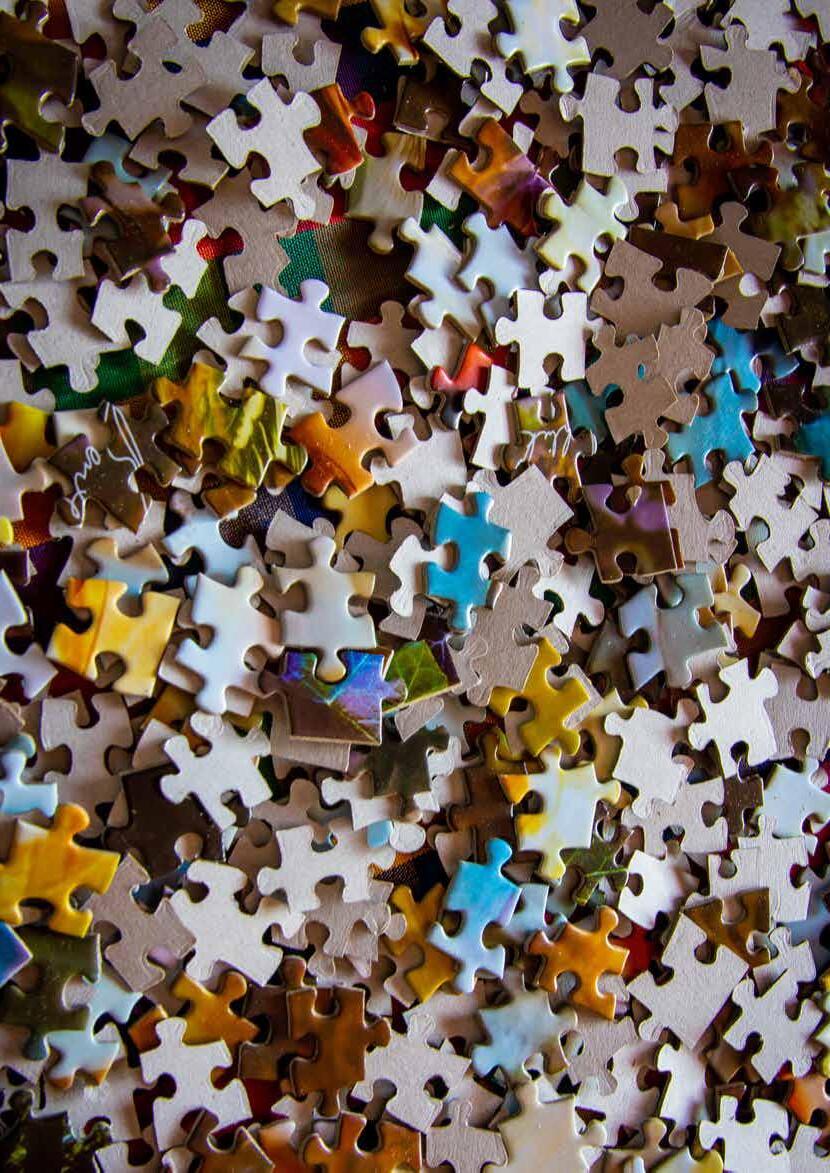
Are you ready for Issue 4?!
Deadlines have closed, and the magazine is currently in its editing and designing phase. Make sure to keep a lookout on our social media for the theme, and when physical copies will be available!
Want to know what Issue 4’s theme is? Have a look at the picture on this page for a clue, or follow us @empire.times on Instagram, and @empire times on facebook where we’ll be announcing the themes for every iisue!
Flynn the Mallard Duck is going to be a regular occurrence throughout all of our issues this year! So, make sure to keep an eye out for him as you read the magazine for your chance to win a prize!
If you want to contribute to the magazine, please don’t hesitate to contact us with any ideas or submissions you have. Whether it be for a story, poem, photo-spread, cartoon, or article, we’d love to hear from you.

Mark your calendars! Issue 5 deadlines close on JUNE 3rd! The theme is SEX & BODY POSITIVITY. Feel free to take the theme as literally or as figuratively as you’d like!
Contact us at empiretimes@flinders.edu.au, through our website at empiretimesmagazine.com, or @empire.times on Instagram, and @ empire times on facebook.
Many students face issues or difficulties during their studies. Our academic advocates are here to help explain policies and procedures, to make sure you understand your options and rights.
We can support and advise you on issues like:
• reviews of grades for assignments and topics
• re-marks of assignments
• academic integrity
• student progress
• remission of fees
• placement problems
• lodging formal complaints
Our financial counselling service is here for all things money-related and can help you find ways to improve your financial situation.
If you’re in financial difficulty we have emergency financial assistance, interest-free $500 loans, and can help in working out how to make a budget. Our financial counsellor can also negotiate with creditors on your behalf and help with uninsured car accidents, disconnection of utilities, and unpaid fines.
We are available for appointments via telephone, Microsoft Teams and face-to-face appointments. Our services are free and confidential to all students.
